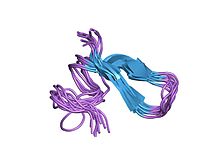Paralytic peptides
| GBP_PSP | |||||||||
|---|---|---|---|---|---|---|---|---|---|
 Structure of a paralytic peptide from an insect, Manduca sexta | |||||||||
| Identifiers | |||||||||
| Symbol | GBP_PSP | ||||||||
| Pfam | PF02425 | ||||||||
| InterPro | IPR003463 | ||||||||
| SCOP2 | 1b1v / SCOPe / SUPFAM | ||||||||
| OPM superfamily | 156 | ||||||||
| OPM protein | 2eqt | ||||||||
| |||||||||
Paralytic peptides are a family of short (23 amino acids) insect peptides that halt metamorphosis of insects from larvae to pupae. These peptides contain one disulphide bridge. The family includes growth-blocking peptide (GBP) of Mythimna separata (Oriental armyworm) and the paralytic peptides from Manduca sexta (tobacco hawkmoth), Heliothis virescens (noctuid moth), and Spodoptera exigua (beet armyworm) [1] as well as plasmatocyte-spreading peptide (PSP1).[2]
References[edit]
- ^ Skinner WS, Dennis PA, Li JP, Summerfelt RM, Carney RL, Quistad GB (July 1991). "Isolation and identification of paralytic peptides from hemolymph of the lepidopteran insects Manduca sexta, Spodoptera exigua, and Heliothis virescens". Journal of Biological Chemistry. 266 (20): 12873–7. doi:10.1016/S0021-9258(18)98775-2. PMID 2071576.
- ^ Volkman BF, Anderson ME, Clark KD, Hayakawa Y, Strand MR, Markley JL (February 1999). "Structure of the insect cytokine peptide plasmatocyte-spreading peptide 1 from Pseudoplusia includens". Journal of Biological Chemistry. 274 (8): 4493–6. doi:10.1074/jbc.274.8.4493. PMID 9988679.
